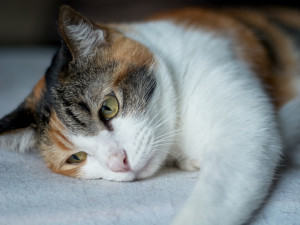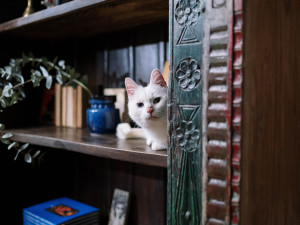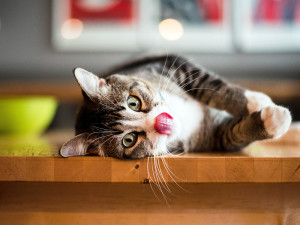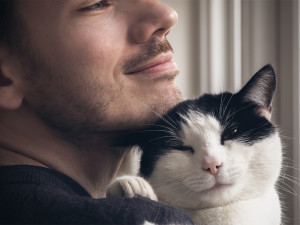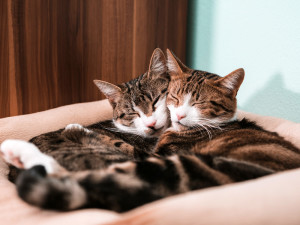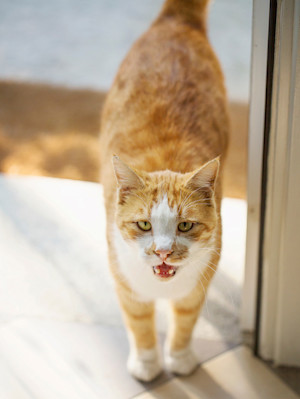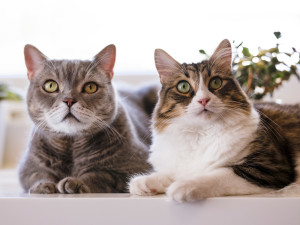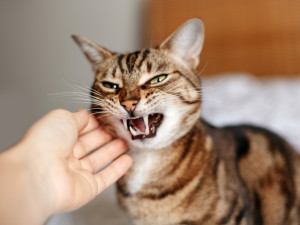Everything You Need to Know About Your Cat’s Incredibly Powerful Nose
They have up to 200 million odour receptors that can pick up all the good (and horrible) smells. Learn how to best support their sensitive sniffers
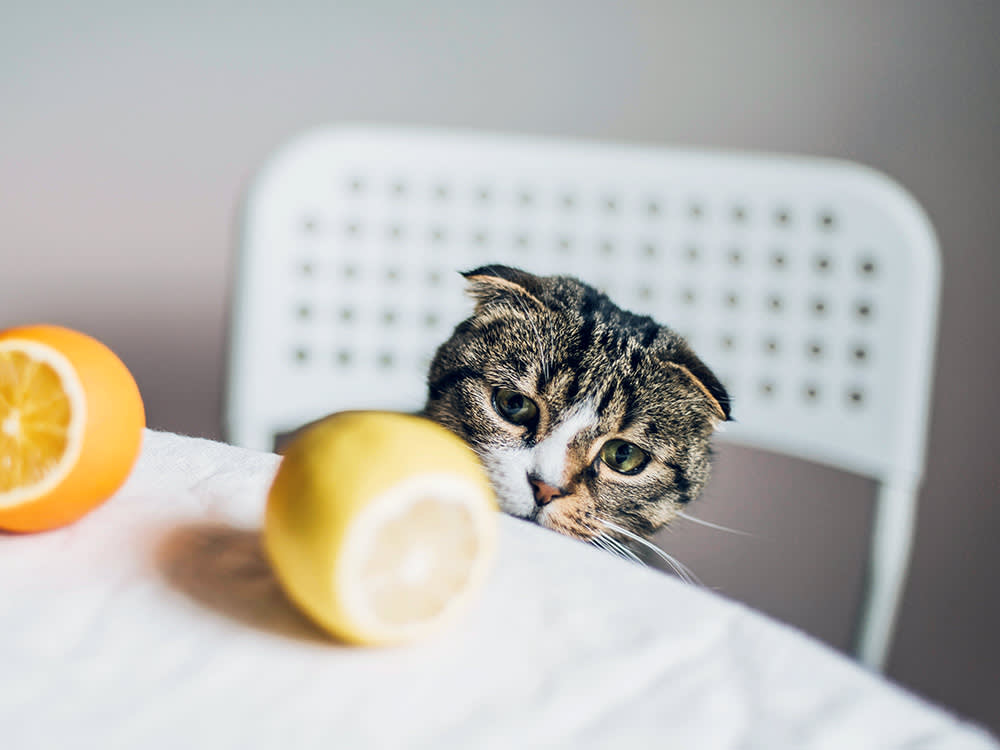
Share Article
If we’ve learnt anything from social media, it’s that cats have a very acute sense of smell. Just head to Instagram for ample evidenceopens in new tab of cat parents documenting their kitties’ stomach-turning reactions after smelling something unpleasant. This gagging reflex is mostly normal, but what makes their noses so sensitive?
Cats potentially have up to 200 million odour receptorsopens in new tab, with a sense of smell that’s 14 times greater than humans. While dogs may have more receptors overall, cats are far better at distinguishing between scents. All of this is to say: science backs up the fact that felines are really good at smelling.
To understand how we can cater to cats’ amazing olfactory abilities and avoid anything that would seriously upset their delicate noses, Kinship spoke to Dr Mikel Delgadoopens in new tab, a scientist and respected cat expert. Dr Delgado has devoted her professional life to understanding domestic cat behaviour and explains which types of scents we might want to introduce to them at home (as well as the toxins to avoid), why we should rethink laundry day and how the trend of cat aromatherapy is actually a pretty bad idea.
This interview has been edited for length and clarity.
How important is the sense of smell to cats?
For cats, olfaction is much more important than vision. People understand that dogs have a really good sense of smell, because they have jobs related to bomb detection, drug detection, that sort of thing.
But it’s still very hard for us to understand that vision isn’t cats’ go-to sense, because their vision is pretty limited. They’re kind of nearsighted and farsighted – so a lot of things are fuzzy to cats. And that’s fine. They really use a lot of other senses. When you look at just the functioning of their nose, their sense of smell is much better than ours.
How do they use this heightened sense of smell?
What it seems to be most used for is social interactions. If you think about the evolution of the species, their closest ancestors are a solitary species that does not have a lot of social interaction. And so using olfaction to communicate is a really good way of doing non face-to-face communication.
If a cat is trying to avoid other cats – maybe this is their territory or their space – it’s easy for them to leave an olfactory cue such as, ‘Hey, I was here yesterday at 3pm,‘ rather than do face-to-face interactions that could lead to types of aggression, such as fighting.
What are some scents they like?
Every cat is different, so what they’re going to respond to is different. Most of them are going to have some kind of gustatory appeal, like food smells, so those are going to be attractive to cats. And then you kind of get to individual levels, like some cats do seem to enjoy smells like lavender. But other cats don’t seem to respond positively to it.
What are your thoughts about the trend of cat aromatherapy?
I don’t generally recommend aromatherapy for cats, because I think people tend to overdo it, and there’s just very little evidence that it provides any health benefits. You always want to be careful when you’re introducing any kind of essential oils, because a lot of them are very toxic. Make sure those scents are safe, first of all, but also not overwhelming. If you think about how much more sensitive their sense of smell is than ours, a little goes a long way.
What about plant scents? Are those good for them to sniff?
Cats like to eat plants, so people should always check safe-plant lists. There are safe plants that most cats, or some cats, will react to. Catnip is a good example. That’s the most commonly known plant that cats have what seems like a pleasurable response to.
Research shows that their dopamine system is activated when they’re smelling some of these plants. Catnip is safe, and about 60 percent of cats respond to it. Anything in the mint family some cats may respond – catnip is a mint, for example.
Even more popular is silver vine, which is also known as Japanese catnip or matatabi. It’s in the kiwi family, and research has shown that more cats respond to silver vine than to catnip. So, I always recommend people give it a try.
If I want to introduce my cat to a new smell, how do I do that?
There are products on the market designed for cats, so I would start there. You can get little discs of tatarian honeysuckle. You can get silver vine powder. You can get catnip toys. You can get valerian powder.
You can always put these things in something else, such as a tea ball or sock. I’m not saying you can’t introduce other scent enrichment to your cat because some cats do enjoy just sniffing. But where I tend to see things go awry is introducing artificial scents.
What kinds of artificial scents?
Perfumes can be aversive to cats, heavily scented hair and skin products, scented air freshener plug-ins, burning incense and heavily scented candles can all be unpleasant to cats because they’re artificial. A lot the time people use these products to try to hide the odour of the litter box, instead of cleaning the litter box properly. If you clean your litter box properly, it should not smell bad.
The other thing that’s important, too, is not laundering all of your cat’s bedding at once. If your cat has several beds, I always recommend just laundering one at a time. A lot of their comfort in their environment is because it smells like their scent or the scents of the cats they live with. So, you don’t want to wipe it out all at once.
Speaking of cleaning products, it is true they hate the smell of citrus?
People have suggested it as a deterrent, like to keep cats out of your garden, but I have not seen it be that effective. But it is possible – like I said, every cat is different. I don’t think if you eat tangerines your cat is going to run away from home or anything, but you probably don’t want to put citrus odours on their bedding.
What are some scents that would deter cats from behaviour you don’t want?
I don’t use those methods of training. Whenever you’re trying to change a behaviour, it really depends on what the motivation for the behaviour is. So, you need to address the underlying reason for the behaviour.
Cats usually want to get on counters because there’s food there. Or they want attention. Or they just like to be up high. So if they don’t have other outlets for those behaviours… you can put all the lemon peels you want on your counter, but if there’s a steak up there, they’re still going to jump up on the counter.
If I want to clean my house or negate a scent, what are my options?
I like air purifiers. I like enzyme cleaners. It doesn’t just kind of cover the smell, it actually removes it. But in general, I like to use natural cleaning products.
The best way to keep the litter box from smelling bad is to scoop it twice a day. Use a clumping litter. Change the litter when it starts getting old, and clean the inside walls of the litter box regularly. If you do all those things, you should not have a heavy odour in your house. And if your cat has litter-box avoidance issues that are causing odours in your house, you should get a behaviour professional to help you solve that problem.
References:

Nisha Gopalan
Nisha Gopalan has been a writer/editor for The New York Times, New York magazine, Entertainment Weekly, Variety, The Hollywood Reporter, and NYLON magazines. She currently resides in Los Angeles.
Related articles
![Two tabby cats in embrace lying in cushion.]()
What Are Cat Pheromones and How Do They Work?
Communication is key, and pheromones are your cat’s version of DMs
![Red Cat On Threshold Looks At The Camera And Meows.]()
Why Is My Cat Heavy Breathing?
This can happen over time or very suddenly. Either way, it’s important to learn more about this symptom
![Male and female cat lying side by side.]()
Male vs Female Cats: What Are the Differences?
There’s more to it than you might think
![Cat hissing at a person attempting to pet its cheek]()
Does Your Cat Hate Your New Partner?
How to help your kitty warm up to your SO

